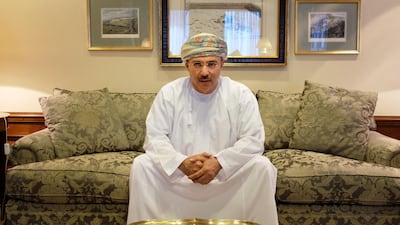Connecting to the Future – A Blueprint for Dynamic Leadership by Mohammed Alardhi is part-memoir, part-business handbook and begins with a comparison between leading a wealth management firm and flying a high-performance fighter jet, which is, perhaps, not surprising given the author's background.
Mr Alardhi is executive chairman of Bahrain-based Investcorp, chairs the Muscat Stock Exchange and Sohar International Bank and is a contributor to this news organisation’s opinion pages. He is also on the international advisory board of the Brookings Institution and the World Economic Forum Community of Chairpersons.
He was the longest serving native head of the Royal Air Force of Oman and is a self-described “bridge builder” in the business world.
Born in the early 1960s, the Oman of Mr Alardhi’s childhood is almost unrecognisable to the modern observer.
“There was no running water, no electricity, only six miles of paved road” and barely any formal education system, he writes of those almost universally hardscrabble years in the Arabian Gulf. It would take the accession of Sultan Qaboos in 1970 to energise and modernise the country.
Mr Alardhi’s career begins in the air force in which he hones his leadership style, before moving into the world of finance. He notes that his years in military service were, in some ways, ideal preparation for the switch.
“It’s like moving from one cockpit to another. You need to learn a new cockpit and checklist, but you already have the aptitude and mindset. The flying is the same,” he writes.

He joined the board of directors of the Bahrain-headquartered firm Investcorp in 2008. The firm had been built into a $10 billion organisation by its founder Nemir Kirdar over the course of the preceding 25 years, earning a good reputation for its considered deal-making.
The collapse of Lehman Brothers, which was the trigger for, and emblem of, the 2008 global financial crisis, happened only a few months later. Mr Alardhi’s feet were barely under the table when this “cascade of crises” flowed towards him. Such high-wire days required agility and clarity of thought amid a period of near universal jeopardy around the world.
He became Investcorp’s executive chairman in 2015 and set about pushing the group forwards. The best passages of the book offer reflections from these years, in which he oversaw significant growth.
Military history gave Mr Alardhi some of the requisite navigational tools to chart the company’s course. He notes that Napoleon won battles when he gave his commanders more autonomy and flexibility, and lost them when he was more instructional and directive.
Mr Alardhi’s sometimes used method was to “lead from behind”. The example from military history here is of army leaders making evaluations in operations rooms or, more rurally, of a shepherd pushing their flock forward while being able to see the entire group from the back.
His commercial prescription often involved questioning the status quo, strengthening internal communications and making staff reassess themselves.
The concept of situational awareness – or knowing what is happening around you and how to react – is another trait he acquired as a fighter pilot. It served him well in the world of finance.
Connecting to the Future makes interesting observations about appraisal processes, an obsession of the modern workplace, and how to redirect them to change employee culture.
“I had noticed that people were grading themselves as star performers when they had achieved only what they were supposed to achieve,” he writes.
“If that’s the case, you are not a star performer. You have met your objectives.
“If you have exceeded your goals, then you’ve accomplished more than your objectives. But only if you have doubled or tripled what you were supposed to do can you call yourself a star performer,” he writes.
So, too, are the passages about missteps and dead deals, like the company’s 2022 bid for AC Milan, one of European football’s most successful clubs. The proposed acquisition didn’t happen, but there was seemingly no sadness within Investcorp when it did not.
“Failing with good intentions has to be publicly celebrated,” he notes, while adding that understanding the specifics of why a deal does not move forward is vitally important to developing and maintaining the right corporate culture.
More generally, failure is not a regular part of the company’s vernacular, which has billions of dollars of assets under management. Investcorp Capital recently listed on the Abu Dhabi Exchange following a successful initial public offering.
Realism most definitely is part of their daily dialect, however.
“We’re going to make mistakes. That’s how we learn,” he notes. “We just try not to make the same mistake twice.”


